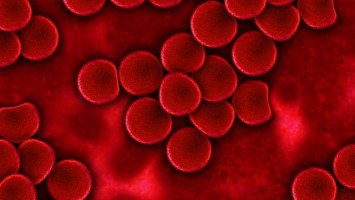
Acute myeloid leukaemia driven by tandem duplications within the UBTF gene (UBTF-TD AML) is a high-risk paediatric cancer in urgent need of novel therapeutic options.
To better understand this disease and how to treat it, St. Jude Children’s Research Hospital scientists studied what was causing UBTF-TD to behave abnormally.
They revealed how the duplicated gene segment on the UBTF gene gives the resulting protein an abnormal transport signal.
This signal was shown to act like a handle for the transport protein Exportin-1, which positions UBTF-TD at specific genes associated with AML, driving their abnormal expression.
Inhibiting Exportin-1 showed promise as a novel strategy to treat UBTF-TD AML.
The findings were published in the journal Blood Cancer Discovery.
UBTF-TD drives a subtype of AML known among physicians for treatment resistance and relapse.
Previous work from co-corresponding author Jeffery Klco, MD, PhD, St. Jude Department of Pathology, revealed how UBTF-TD played a role in oncogene overexpression in cancer and uncovered its susceptibility to Menin inhibitors.
The new research takes the work further by digging into the mechanism at the heart of UBTF-TD AML and uncovering another target for potential therapeutic development.
“In a short period of time, we’ve gone from identifying a new high-risk molecular subtype of AML to nominating multiple mechanism-based therapeutic strategies,” Klco said.
“This recent study highlights the power of collaboration between labs with different areas of expertise.”
Exportin-1 grabs hold of rogue UBTF-TD nuclear localisation signal
Using genomic, proteomic, structural, and functional analyses in laboratory and preclinical models, Klco and co-corresponding author Richard Kriwacki, PhD, St. Jude Department of Structural Biology, explored the new protein interactions with UBTF-TD that may be behind the DNA binding patterns previously noted to molecularly characterise UBTF-TD AML.
The researchers noted that UBTF-TD was unexpectedly interacting with proteins that facilitate transport outside of the nucleus, such as Exportin-1.
Further investigation revealed that the altered protein harboured a rogue transport signal for Exportin-1.
“We identified that many of these tandem duplications converged on a region that gave rise to a very specific amino acid sequence,” explained co-first author Juan Barajas, PhD, St. Jude Department of Pathology.
“They were heterogeneous in their exact makeup, but all resembled a nuclear export signal. That was our first early clue in figuring out this mechanism.”
“Once the proteomics data suggested UBTF with tandem duplications was binding to Exportin-1, we designed experiments to probe for protein binding and structure directly, using purified components,” said co-first author Aaron Phillips, PhD, St. Jude Department of Structural Biology.
“All of the tandem duplications we tested disrupt the folded structure of part of the protein, allowing for exposure of the amino-acid sequence that binds Exportin-1.”
Further work revealed that Exportin-1 was grabbing hold of the unnatural nuclear export signal like a handle and was steering UBTF-TD to genes found dysregulated in UBTF-TD AML, driving their overexpression, rather than outside of the nucleus, like the typical function of Exportin-1.
They confirmed this by disrupting the interaction using Exportin-1 inhibitors, which reduced tumours in patient-derived models.
The study offers a potential route to bolster therapeutic options for UBTF-TD AML.
“This study exemplifies the value of trans-disciplinary collaboration between structural biologists and translational cancer biologists,” Kriwacki said.
“While we’ve gained initial insights into new approaches for treating AMLs harbouring UBTF-TD, continuing studies into other biomolecules present in UBTF-TD/Exportin-1 assemblies may enable even more specific therapeutic targeting in the future.”
The study’s other authors are Evangelia Papchristou and Clive D’Santos, University of Cambridge; and Jina Wang, Melvin Thomas, Lisett Contreras, Masayuki Umeda, Ryan Hiltenbrand, Elizabeth Caldwell, Michael Walsh, Guangchun Song, Lauren Ezzell, Kelly Churion, Tamara Westover, Emily Xiong, Chandra Rolle, Jamila Moore, Josi Lott, Sandi Radko-Juettner, Amit Kumar, Wenjie Qi, Beisi Xu, Jing Ma, Burgess Freeman and Laura Jane, St. Jude.
The World Cancer Declaration recognises that to make major reductions in premature deaths, innovative education and training opportunities for healthcare workers in all disciplines of cancer control need to improve significantly.
ecancer plays a critical part in improving access to education for medical professionals.
Every day we help doctors, nurses, patients and their advocates to further their knowledge and improve the quality of care. Please make a donation to support our ongoing work.
Thank you for your support.